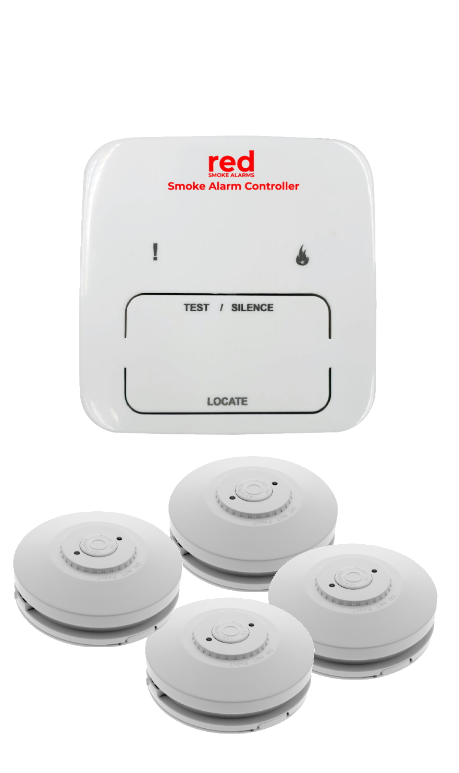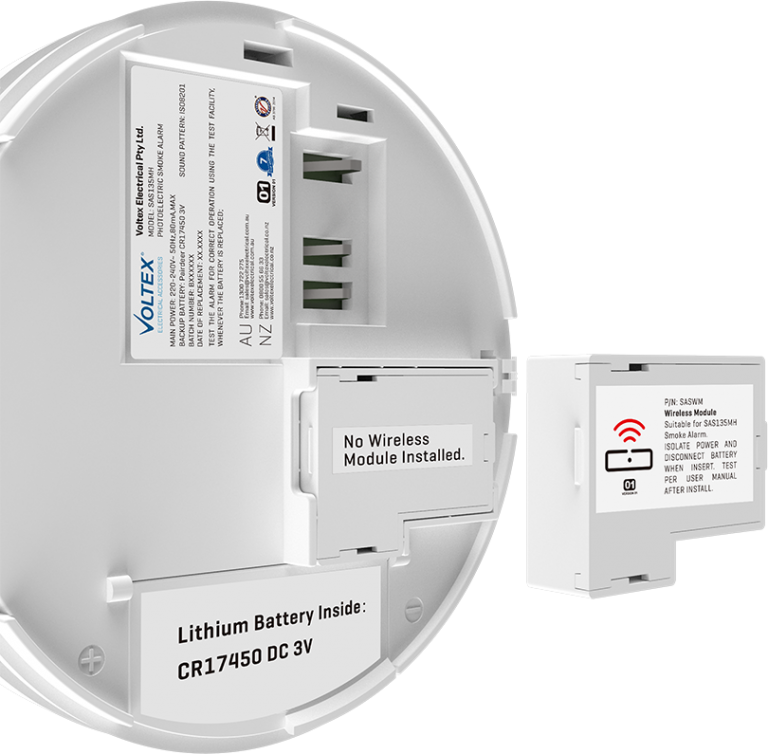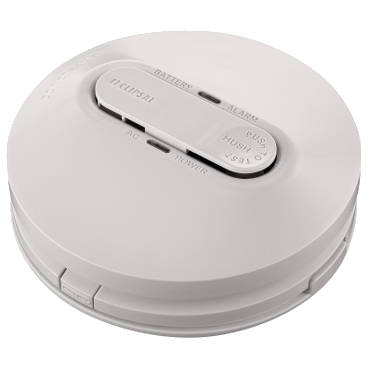Smoke Alarm Installation & Testing
Protect your home with interconnected photoelectric smoke alarms
One of the most important ways to protect your family is with the latest smoke alarms. The Queensland government has recognized this and introduced new smoke alarm laws that have been phasing in since Jan ’17. These laws require installation of interconnected photoelectric smoke alarms.
Smoke Alarm Installation
- Fully compliant with Queensland legislation
- Photoelectric smoke detectors
- Interconnected alarms
- Installed in compliance with Queensland laws
South East Electrical use the best smoke detector systems available. Below are our three main solutions for interconnected photoelectric smoke alarms. These solutions provide cost-effective ways for you to become fully compliant and keep your home safe. All our smoke alarm installations are done to ensure compliance with the new and incoming Queensland laws. (For more information, read about the Queensland Smoke Alarm Legislation.) You can reply on South East Queensland to make your home safe and compliant with current and incoming laws.
Red Smoke Alarms
This 100% Australian owned company manufactures and sells smoke alarms with a 10 year warranty. Given that you’re required to replace your smoke alarm after 10 years, that means you never own a smoke detector that isn’t under warranty.
They’re functionally great also. With a central controller that connects to each alarm, you can test, locate and silence any alarm from a central location. If you’re a landlord, allowing your occupant to silence false alarms at the push of a button reduces call outs. If you’re the occupant, then silencing an alarm without poking at a screaming alarm with a broom is a game-changer.
They also have a hush button. So if you know you’re about to burn the toast, hush the smoke alarm at the push of a button before the smoke rises.
- Instantly silence alarms
- Instantly locate alarm that is false alarming
- Allows tennants to deal with false alarms instantly and easily
- Silence alarms by simply pushing one button on the wall
- Detectors are 240v with hardwired interconnect and 12v battery backup
Voltex Smoke Alarms
The Voltex smoke alarms are a great alternative where there is no ceiling for us to install cables in. With their 10 year lithium batteries and wireless interconnect system, these smoke alarms can satisfy Queensland laws without being connected via cables.
They come with a 7 year warranty, meaning most of the alarm’s functional lifespan will be covered by warranty.
- Does not need cables
- Interconnected wifi solution
- Cost-effective smoke alarms when ceiling spaces aren't available
Clipsal Smoke Alarms
Clipsal are one of the most recognizable names in electrical and smoke detector equipment. This highly respected brand supplies reliable and effective smoke alarms.
We use Clipsal smoke alarms when adding to an existing installation. This allows us to provide a cost-effective solution that provides safety and compliance for the household.
- Highly reliable and effective
- Used when adding to existing installations
Call Us Today About Smoke Alarm Installation
Smoke Alarm Booking Inquiry
"*" indicates required fields
We are South East Queensland electricians for smoke alarm testing and installation.
Experts in interconnected photoelectric smoke detectors, fully versed in the compliance requirements for Queensland legislation.
Smoke Alarm Testing
Our Smoke Alarm Testing Services
South East Electrical provides comprehensive smoke detector testing for agents, landlords, and tenants.
The test will include the following:
- Check the expiry date (detectors 10+ years must be replaced)
- Test and swap the batteries
- Perform a smoke test
- Advise whether existing detector locations is correct with current legislation
Perfect for rental properties
Being a landlord, you need to ensure you're compliant with Queensland laws. With recent changes, this means that you should have interconnected photoelectric smoke detectors. If you're unsure of your properties compliance, book our smoke alarm testing service today.
Book Your Smoke Alarm Test
Keep your property safe and keep it compliant with our smoke alarm testing.
Smoke Alarm Legislation
What You Need To Know About Smoke Alarms In Queensland
New smoke alarm legislation will make Queensland households the safest in Australia in relation to fire safety.
The new legislation specifies that all Queensland dwellings will be required to have interconnected photoelectric smoke alarms in all bedrooms, in hallways that connect bedrooms with the rest of the dwelling and on every level.
Queensland Government
About three quarters of Queensland deaths in home fires are in homes without smoke alarms.
It's a simple fact that smoke detectors save lives. As a home owner you have a responsibility to make sure your smoke detectors are operating correctly. The new interconnected photoelectric smoke detectors increase safety over older smoke alarms.
With the introduction of new smoke alarm legislation in Queensland your obligations as a home owner or landlord have changed.
To comply with legislation, interconnected photoelectric smoke alarms are required:
- From 1 January 2017: in all new dwellings and substantially renovated dwellings (this applies to building applications submitted from 1 January 2017).
- From 1 January 2022: in all domestic dwellings leased and sold.
- From 1 January 2027: in all other domestic dwellings.
Current Smoke Alarm Laws
- Existing smoke alarms manufactured more than 10 years ago must be replaced with photoelectric smoke alarms which comply with Australian Standards (AS) 3786-2014. (Note: the date should be stamped on the back)
- Smoke alarms that do not operate when tested must be replaced immediately.
- Existing hardwired smoke alarms that need replacement, must be replaced with a hardwired photoelectric smoke alarm.

Looks For This Sticker On Your Smoke Alarms
Smoke alarms must comply with the Standard AS 3786-2014.
Incoming Smoke Alarm Laws
The following will come into effect by 2027.
- All private homes, townhouses and units will require hardwired photoelectric, interconnected smoke alarms. If a hardwired smoke alarm cannot be installed, non-removable 10-year battery smoke alarms can be installed in place.
- Detectors must be placed in accordance with the following diagram:

Smoke Alarm FAQ
The short answer is, photoelectric alarms are better at sensing smoke than ionization alarms. Research has shown that the majority of home fires start as smouldering fires, where there is more smoke but less flame. Ionization alarms are good at detecting fires but not as good when their is smoke. Smoke can be lethal on its own so it’s important for fire alarms or react to smoke.
Ionization alarms have a small amount of radioactive material in them, held between two electronically charged plates. Ions flow between the plates (because of the radioactive material) and is measured. When smoke passes between the plates it disrupts this flow of ions. This is when the alarm is triggered.
Photoelectric alarms are light sensing alarms. They have a light that is angled away from away from the sensor. When smoke entered the chamber, it difuses and refracts that light, causing some to hit the sensor. This is when the alarm is triggered.
Yes, you can.
There are several things for you to consider. The first is your compliance requirements. This is especially pertinent of you’re a landlord. You need to make sure you’re fully compliant with the current and future legislation.
Next you should consider that the alarms, if not hard wired, should have a 10 year battery in them. These are available on the market so make sure you get 10 year battery smoke larms only.
Lastly, make sure they’re interconnected. You can, for instance, get Google Nest smoke alarms, which will interconnect via an app. They’re currently $189* each though, so oftentimes they’re more expensive than having us do the job for you, for any decent sized home.
*JB Hi Fi at time of writing, Oct 2021.
Regardless of which make or model of alarm you have, you must replace it every ten years.
That applies for both hard wired and battery operated alarms. During their lifespan, they can accummulate dust and debris that will cause them to be ineffective. Ten years is a long time for them to operate flawlessly. It is therefore a legal requirement to change the alarms after ten years.
The most basic test of a smoke alarm is to press and hold the test/hush button for 3 seconds. It should sound a test alarm for you.
Make sure that all (interconnected) alarms sound when you press the button.
You should do this every month.
A more advanced test is to use a smoke alarm tester to test how well it detects smoke.
Do not ignite combustible materials to test your smoke alarm. This can cause accidents.
The quick answer is, you have a flat battery.
This is a common problem for older smoke alarms. Their 9V battery should be replaced every year.
What is happening is, your alarm can no longer maintain the voltage it needs to properly monitor your home. If sends out a warning chirp to let you know.
Replace the battery immediately. (You should also consider upgrading your alarms at this point, if you don’t already have interconnected photoelectric alarms.)
Ionisation smoke alarms have a small piece of radioctive material in them. The decay of that radioactive material allows a current to pass between to contact points. (That’s what ionisation is.) When smoke interupts the ionisation, the detector knows it should down and alarm.
Ionisation alarms looks like this:
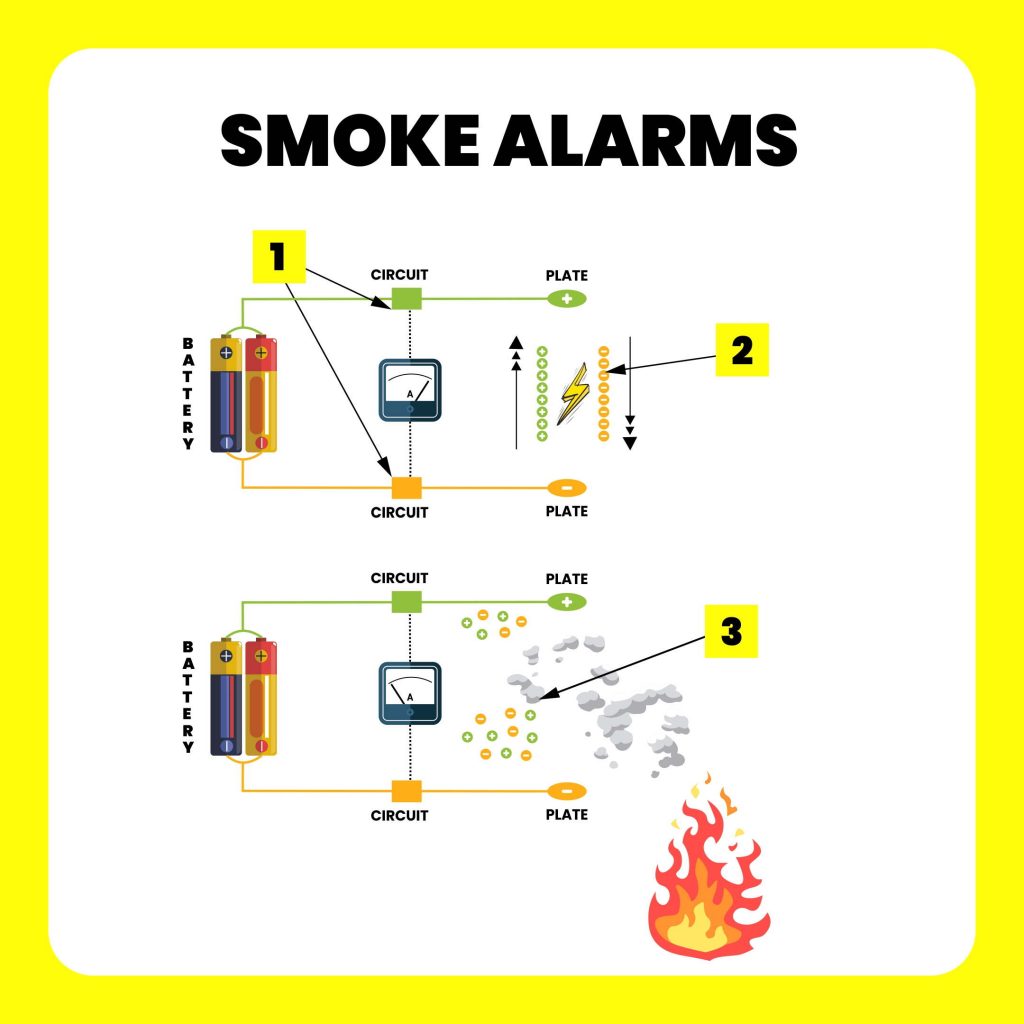
Photoelectric smoke alarms shine a beam of light. When that beam is refracted by smoke, it hits a sensor and the alarm is sounded. Like this:
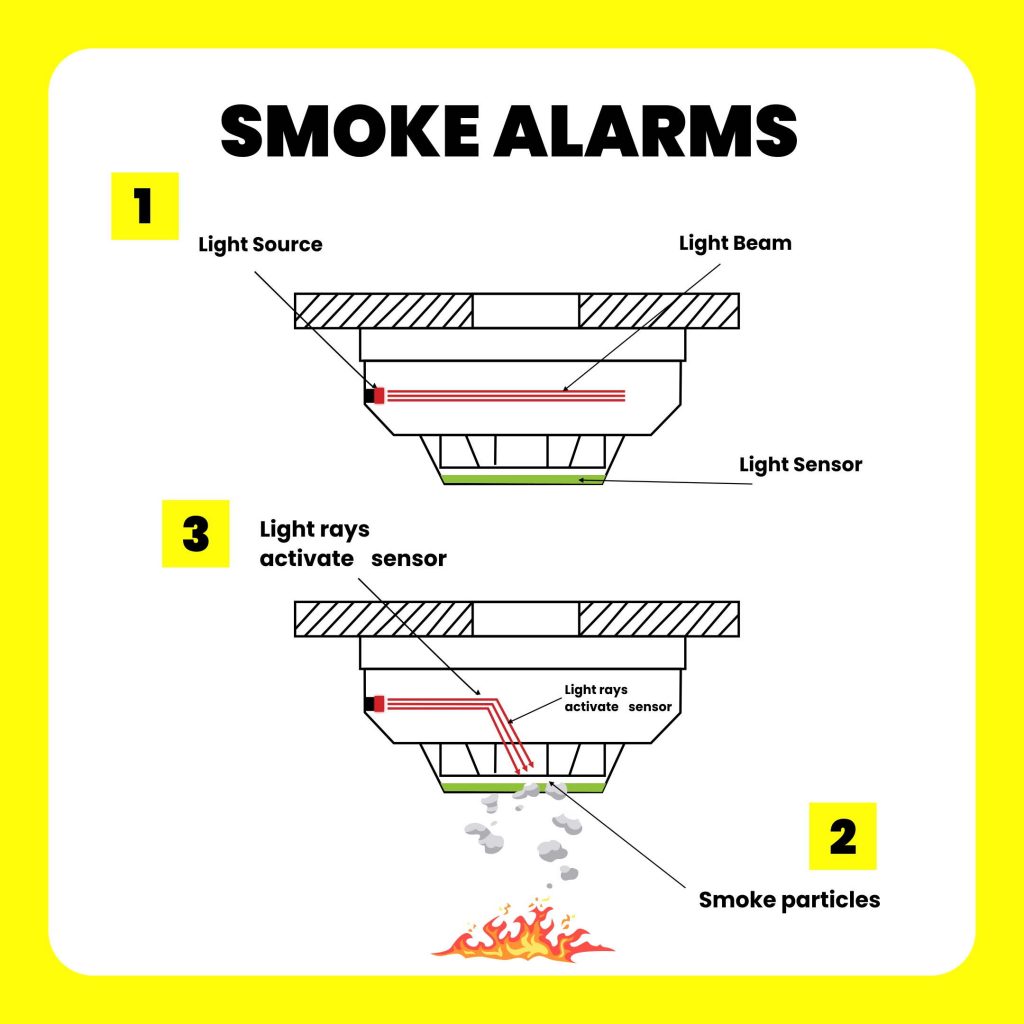
Photoelectric smoke alarms have been shown to be more effective at detecting smouldering fire. These are the types of fires most commonly experienced in the home. They can, therefore, give you earlier warning of fires in your home.

